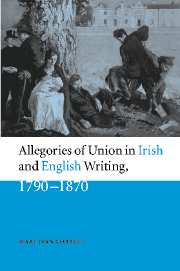 Allegories of Union in Irish and English Writing, 1790–1870
Allegories of Union in Irish and English Writing, 1790–1870 Book contents
- Frontmatter
- Contents
- Acknowledgments
- Introduction
- Chapter One Public affections and familial politics: Burke, Edgeworth, and Ireland in the 1790s
- Chapter Two Allegories of prescription: engendering Union in Owenson and Edgeworth
- Chapter Three Troubling others: representing the immigrant Irish in urban England around mid-century
- Chapter Four Plotting colonial authority: Trollope's Ireland, 1845–1860
- Chapter Five England's opportunity, England's character: Arnold, Mill, and the Union in the 1860s
- Afterword
- Notes
- Bibliography
- Index
Chapter Four - Plotting colonial authority: Trollope's Ireland, 1845–1860
Published online by Cambridge University Press: 22 September 2009
- Frontmatter
- Contents
- Acknowledgments
- Introduction
- Chapter One Public affections and familial politics: Burke, Edgeworth, and Ireland in the 1790s
- Chapter Two Allegories of prescription: engendering Union in Owenson and Edgeworth
- Chapter Three Troubling others: representing the immigrant Irish in urban England around mid-century
- Chapter Four Plotting colonial authority: Trollope's Ireland, 1845–1860
- Chapter Five England's opportunity, England's character: Arnold, Mill, and the Union in the 1860s
- Afterword
- Notes
- Bibliography
- Index
Summary
In taking up his position for the Post Office in Ireland in 1841, Anthony Trollope – like so many other men of his time and place – migrated to a colony to better himself professionally and economically. According to his own report in An Autobiography (1883), his peers among the clerks in the London office did not view the move as especially clever: “There was … a conviction that nothing could be worse than the berth of a surveyor's clerk in Ireland … It was probably thought then that none but a man absurdly incapable would go on such a mission to the west of Ireland.” Yet the material benefits were considerable, as Trollope soon realized, particularly compared to English conditions of paid work:
My salary in Ireland was to be but £100 a year; but I was to receive fifteen shillings a day for every day that I was away from home, and sixpence for every mile that I travelled. The same allowances were made in England; but at that time travelling in Ireland was done at half the English prices. My income in Ireland, after paying my expenses, became at once £400. This was the first good fortune of my life. (An Autobiography 58–59)
Financially speaking, then, it is no exaggeration to say that “Ireland made Trollope.”
- Type
- Chapter
- Information
- Allegories of Union in Irish and English Writing, 1790–1870Politics, History, and the Family from Edgeworth to Arnold, pp. 114 - 147Publisher: Cambridge University PressPrint publication year: 2000


